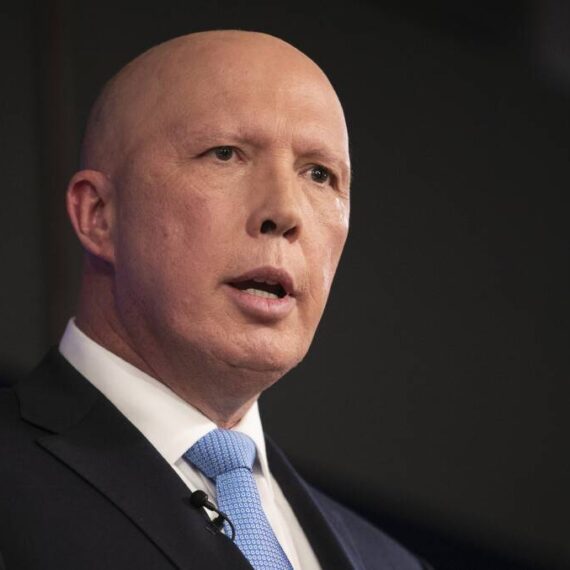China Gives Australian Writer Suspended Death Sentence as Spy Fears Grow
Harsh sentencing of Yang Hengjun, a blogger and spy novelist, comes as Beijing warns of foreign infiltration
China issued a suspended death sentence on Monday to an Australian citizen after convicting him of espionage, a stiff punishment that comes as Beijing steps up warnings about infiltration by foreign spies.
Yang Hengjun, a China-born Australian citizen who is also known as Yang Jun, was detained in 2019 and accused of endangering national security, an umbrella term that includes spying.
Australian Foreign Minister Penny Wong said Monday that she was “appalled” by the judgment, adding that she had summoned the Chinese ambassador in Canberra to protest. A statement by Wong earlier in the day described news of Yang’s sentencing as “harrowing” for him and his family. Wong said she understood the death sentence could be commuted to life imprisonment after two years of good behavior. In China, death sentences commuted to life imprisonment cannot exceed 25 years.
China has offered very few details about Yang’s case beyond saying that he was found guilty of espionage. It didn’t provide any evidence to support the charge. Chinese Foreign Ministry spokesman Wang Wenbin said on Monday that China had acted in accordance with Chinese law and respected Yang’s consular rights.
Yang, a blogger, political commentator and spy novelist who said he worked as a Chinese diplomat before emigrating to Australia, was at times a sharp-tongued critic of China’s ruling Communist Party on social media.
In articles published on The Diplomat, a Tokyo-based online current-affairs magazine, Yang mused about the flaws of China’s one-party system, the lack of freedom of speech in China and the fate of Taiwan’s democracy. In his first novel, “Fatal Weakness,” the protagonist works as a double agent for the U.S. and China, but in fact only serves his own personal interests.
China’s sentencing of Yang comes as it warns its citizens about national security threats, following the tightening of its anti-espionage law in April last year.
In recent weeks, China’s spy agency, the Ministry of State Security, has used its new social-media account to publish a series of articles, several of which claim to have busted foreign intelligence operations. Last month, for instance, the agency said it took into custody a citizen from an unnamed third country whom they alleged was working as a British spy while serving in China as the head of a consulting agency.
Yang’s sentence threatens to undo a recent thawing of relations between China and Australia, one of the U.S.’s closest allies in the region. The two sides had only recently begun to rebuild ties after several years of animosity, a detente that included the resolution of trade disputes and the release by China of another Australian citizen detained by Beijing.
The details of Yang’s case have been shrouded in mystery for the past five years, in line with other cases involving alleged foreign infiltration.
For instance, The Wall Street Journal reported last month that China had been holding a British businessman for more than five years, without any public mention of the case from either Chinese or British authorities. In that case, China’s Foreign Ministry said the businessman, Ian J. Stones, was sentenced to five years in prison for illegally selling intelligence to overseas parties.
Yang’s sentencing, too, came with little warning.
Feng Chongyi, a China studies professor at the University of Technology Sydney and Yang’s former doctoral supervisor, said the Beijing No. 2 Intermediate People’s Court delivered the sentence at 9:30 a.m. local time, citing people who were present at the ruling.
Yang was charged with revealing state secrets to a Taiwanese intelligence official in 1994, Feng said, citing the people in the courtroom. Feng described the charges as “fabricated” and a case of “outrageous political persecution.”
Yang’s sentence is one formally described as a “death sentence with a two-year reprieve,” a relatively common ruling that can be commuted to life imprisonment following two years of good behavior.
Once converted to life imprisonment, Beijing and Canberra would have a legal basis for sending Yang home to Australia, Feng said. Still, he added, “until Yang is released and back in Australia, China can continue to apply pressure on Australia to extract more concessions.”
Feng called on the Australian government to push for Yang to receive treatment on medical parole, pointing to the physical toll of five years of detention.
Yang collapsed several times last year and had difficulty walking the short distance from his bed to the toilet in his jail cell, according to a consular report by Australian officials who visited him in October, and which was cited in a letter by Yang’s two sons to Australian Prime Minister Anthony Albanese last year.
In the letter, which was viewed by the Journal, Yang’s sons wrote that prison authorities had discovered a cyst on Yang’s kidney but declined to provide him with further information.
Yang’s sentence is likely to inflame Australia-China relations after a period of warming ties, said Dominic Meagher, deputy director of the John Curtin Research Centre, a think tank in Melbourne.
“This sentence is a slap in the face of Australia,” said Meagher. The decision to keep Yang in China “extends the issue permanently,” he said, making collaboration between the two countries more difficult.
Yang was apprehended at the airport in the southern Chinese city of Guangzhou in January 2019 after arriving by plane from New York. Initially, Yang was placed under “residential surveillance in a designated location”—a form of detention used by authorities to hold a suspect for interrogation in a secret location—before being formally arrested six months later.
Yang’s detention took place against the backdrop of quickly deteriorating Australia-China relations, with the two sides tussling over influence in the South Pacific and whether Canberra would permit Chinese telecommunications gear-maker Huawei Technologies to do business in the country. Ties soured further when China imposed trade restrictions on Australian beef, barley and wine after Australia’s then-Prime Minister Scott Morrison called for an investigation into the origins of Covid-19.
One month before Yang’s arrest, in December 2018, Beijing detained Canadians Michael Kovrig and Michael Spavor on national-security charges in what Ottawa and Washington described as retaliation for Canada’s arrest of Huawei’s chief financial officer.
Signs that relations were thawing only came after Albanese’s inauguration in May 2022. In January 2023, China lifted its unofficial ban on Australian coal and, seven months later, scrapped tariffs on Australian barley. In October last year, China released Cheng Lei, an Australian journalist who had been detained for more than three years on suspicion of disclosing state secrets.
In November, Albanese flew to Beijing, where he said he raised Yang’s case with Chinese leader Xi Jinping. Albanese didn’t say what response he received.
See Sha Hua’s offical article the Wall Street Journal featuring Dominic Meagher.
Dominic Meagher is the Deputy Director of the John Curtin Research Centre.
Photo: The Age





